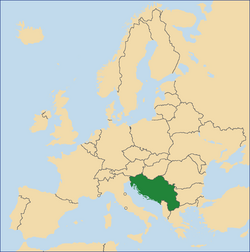Yugoslavia
From Roach Busters
| Line 56: | Line 56: | ||
|- | |- | ||
|'''GDP''' (PPP)<br/> - Total<br/> - Per capita | |'''GDP''' (PPP)<br/> - Total<br/> - Per capita | ||
| - | |2008 estimate<br>$ | + | |2008 estimate<br>$1,125.446 billion<br>$47,000 |
|- | |- | ||
| colspan="2" | <hr> | | colspan="2" | <hr> | ||
Revision as of 20:50, 15 August 2008
| Краљевина Југославија Kingdom of Yugoslavia | |
| | |
 | 
|
| Flag | Coat of arms |
| | |
| Motto "Један народ, један краљ, једна држава" (Serbo-Croatian) ("One nation, one king, one country") | |
| | |
| Anthem Химна Краљевине Југославије (Serbo-Croatian) (National Anthem of the Kingdom of Yugoslavia) | |
| | |

| |
| | |
| Capital (and largest city) | Belgrade 44°48′N, 20°28′E |
| | |
| Official languages | Serbo-Croatian |
| | |
| Recognized regional languages | Slovenian, Macedonian, Montenegrin, Albanian, Hungarian, Slovak, Rusyn |
| | |
| Government - Monarch - Prime Minister | Semi-constitutional monarchy King Alexander III Čedomir Marković |
| | |
| Formation | December 1, 1918 |
| | |
| Area - Total - Water (%) | 255,898 km² 93,320 sq mi 0.37 |
| | |
| Population - July 2007 estimate - Density | 23,945,671 93.57 /km² 256.59 /sq mi |
| | |
| GDP (PPP) - Total - Per capita | 2008 estimate $1,125.446 billion $47,000 |
| | |
| GDP (nominal) - Total - Per capita | 2008 estimate $625.221 billion $26,110 |
| | |
| Gini (2000) | 42.6 (medium) |
| | |
| HDI (2005) | |
| | |
| Currency | Dinar (KYD)
|
| | |
| Time zone - Summer (DST) | CET (UTC +1) CEST (UTC +2) |
| | |
| Internet TLD | .yu |
| | |
| Calling code | +381 |
Yugoslavia (Serbo-Croatian: Jugoslavija), officially the Kingdom of Yugoslavia (Serbo-Crotian: Kraljevina Jugoslavija), is a feudal monarchy located in the Balkans in southeast Europe. It borders Italy and the Adriatic Sea to the west; Austria and Hungary to the north; Romania to the northeast; the Black Sea to the East; Greece to the south; and Albania to the southwest. It has an area of 255,898 km² and a population just shy of 24 million. It has managed, albeit with great difficult, to suppress (for the most part) ethnic nationalism, and fostered a national identity transcending ethnicity, religion, language, etc. Most Yugoslavians get along cordially regardless of their background, and think of themselves as Yugoslavians first; most take great pride in their country and in their king, Alexander III.
